|
|
|
Sort Order |
|
|
|
Items / Page
|
|
|
|
|
|
|
| Srl | Item |
| 1 |
ID:
132383
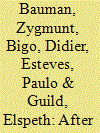

|
|
|
|
|
| Publication |
2014.
|
| Summary/Abstract |
Current revelations about the secret US-NSA program, PRISM, have confirmed the large-scale mass surveillance of the telecommunication and electronic messages of governments, companies, and citizens, including the United States' closest allies in Europe and Latin America. The transnational ramifications of surveillance call for a re-evaluation of contemporary world politics' practices. The debate cannot be limited to the United States versus the rest of the world or to surveillance versus privacy; much more is at stake. This collective article briefly describes the specificities of cyber mass surveillance, including its mix of the practices of intelligence services and those of private companies providing services around the world. It then investigates the impact of these practices on national security, diplomacy, human rights, democracy, subjectivity, and obedience.
|
|
|
|
|
|
|
|
|
|
|
|
|
|
|
|
| 2 |
ID:
108234
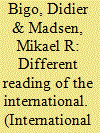

|
|
|
| 3 |
ID:
132335
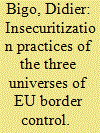

|
|
|
|
|
| Publication |
2014.
|
| Summary/Abstract |
What practices of (in)securitization involve the notions of border and border control in the European Union? How do these practices operate? How are they assembled? In the resulting assemblage, is the notion of borders - understood as state borders - still relevant for the control of individuals and populations moving across the frontiers of the EU? Drawing on empirical observations and with a specific focus on how border control is translated into different social universes, this article seeks to show that practices of control are routinely embedded in a practical sense that informs what controlling borders does and means. This practical sense is itself informed by different professional habitus and work routines involving deterrence and the use of force, interrogation and detention, surveillance of populations on the move and the profiling of (un)trusted travellers. Its strength varies in relation to its shared dimension by most of the operators, and is adjusted to the materiality of borders as well as to the local contexts in which it is deployed. It activates, or does not activate, the maximal use of various control technologies (satellites, pre-registration and interoperable exchange of data between the state and private bureaucracies, biometrics identifiers, body-scanners). For understanding practices of (in)securitization, actual work routines and the specific professional 'dispositions' are therefore more important than any discourses actors may use to justify their activities.
|
|
|
|
|
|
|
|
|
|
|
|
|
|
|
|
| 4 |
ID:
110774
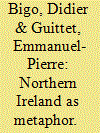

|
|
|
|
|
| Publication |
2011.
|
| Summary/Abstract |
This article questions the fashionable view that Northern Ireland is a counterinsurgency lesson to be learned for the global 'war on terror'. It suggests that Britain's involvement in the Northern Ireland conflict - one of the longest conflicts within Europe in which a government has been at war with a clandestine organization - can be regarded as a meaningful metaphoric utterance in efforts to analyse the practical failures and threat discourses of the global 'war on terror'. Northern Ireland is more than a specific case study: it acts as an appealing metaphor in attempts to understand the logics and pitfalls of the 'war against terrorism', where the increasing primacy granted to terror control - present and future - means that Western governments are increasingly more willing to infringe otherwise inviolable rights in the pursuit of a supposed greater good - security. The article explores the political economy of unease, suspicion, exception and radicalization in the 'war against terrorism'. It concludes that Northern Ireland is not a model that can be exported around the globe but an invitation to analyse contingency, daily operations of security, and their effects on social practices and routines. Northern Ireland also represents a remarkable inducement to assess how exception, suspicion and radicalization are correlated, as well as to recognize that efforts to contain the unpredictability of the future are self-defeating.
|
|
|
|
|
|
|
|
|
|
|
|
|
|
|
|
| 5 |
ID:
108235
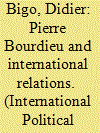

|
|
|
|
|
| Publication |
2011.
|
| Summary/Abstract |
This article demonstrates how the work of Pierre Bourdieu offers a productive way to practice research in international relations. It especially explores the alternatives opened by Bourdieu in terms of a logic of practice and practical sense that refuses an opposition between general theory and empirical research. Bourdieu's preference for a relational approach, which destabilizes the different versions of the opposition between structure and agency, avoids some of the traps commonly found in political science in general and theorizations of international relations in particular: essentialization and ahistoricism; a false dualism between constructivism and empirical research; and an absolute opposition between the collective and the individual. The "thinking tools" of field and habitus, which are both collective and individualized, are examined in order to see how they resist such traps. The article also engages with the question of whether the international itself challenges some of Bourdieu's assumptions, especially when some authors identify a global field of power while others deny that such a field of power could be different from a system of different national fields of power. In this context, the analysis of transversal fields of power must be untied from state centrism in order to discuss the social transformations of power relations in ways that do not oppose a global/international level to a series of national and subnational levels.
|
|
|
|
|
|
|
|
|
|
|
|
|
|
|
|
| 6 |
ID:
163733
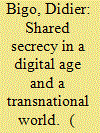

|
|
|
|
|
| Summary/Abstract |
This article examines the notion of shared secrets and the procedures by which secrecy is not the opposite of exchange of information, but the restriction of it to a certain ‘circle’ of people and the maintenance of others in ignorance. It creates corridors depending on the objectives of secret information, the persons having access, and the knowledge of this access by other people. Shared secrecy has been considered as an exception to common practice, but it has changed in scale with digitization and transnationalization of information, especially when suspicion is becoming used in statistical terms for prevention purposes.
|
|
|
|
|
|
|
|
|
|
|
|
|
|
|
|
| 7 |
ID:
150570
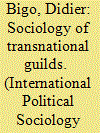

|
|
|
|
|
| Summary/Abstract |
This article seeks to discuss the emergence of transnational groups coming from the core of state bureaucracies and what has sometimes been called the “deep” or “right hand” of the state. In doing so, the article aims to explore the groups’ degree of autonomy in terms of elaboration of politics and their place within the different fields of power that irrigate the international. Are these groups exchanging information transnationally or not? Do they form a group, an elite of professionals, a guild, which has its own agenda and priorities? Have they a sense of solidarity provided by the sharing of a certain kind of know-how that enters into tension with the loyalty to a national agenda? And, if this exchange of information exists, as evidenced by the Snowden leaks, does it concur or not with the establishment of specific national security priorities?
|
|
|
|
|
|
|
|
|
|
|
|
|
|
|
|
| 8 |
ID:
083316
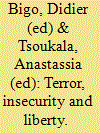

|
|
|
|
|
| Publication |
London, Routledge, 2008.
|
| Description |
ix,198p.
|
| Series |
Routledge studies in liberty and security
|
| Standard Number |
9780415466288
|
|
|
|
|
|
|
|
|
|
|
|
Copies: C:1/I:0,R:0,Q:0
Circulation
| Accession# | Call# | Current Location | Status | Policy | Location |
| 053862 | 323.49/BIG 053862 | Main | On Shelf | General | |
|
|
|
|
|
|
|
|
|